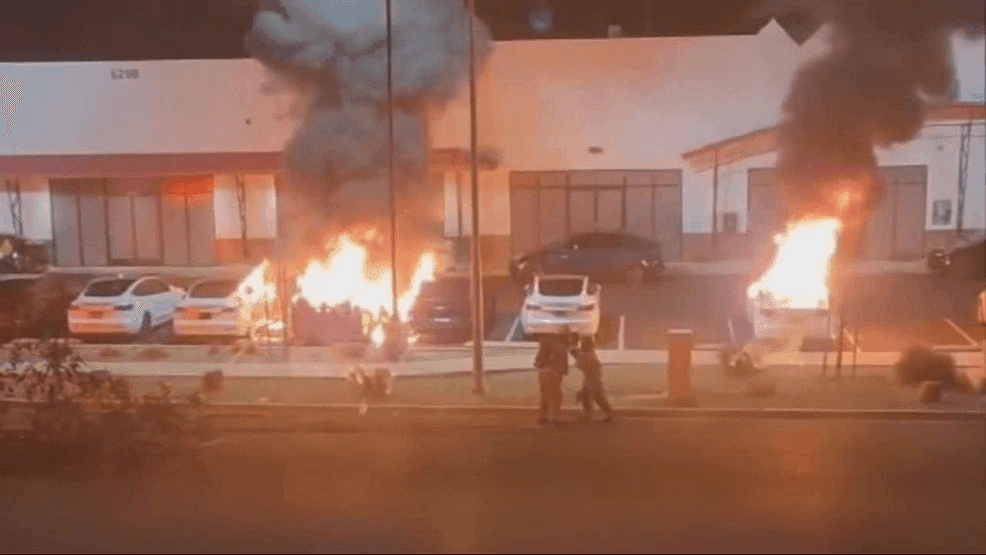On New Year’s Eve in New Orleans, a Tesla parked quietly in a residential neighborhood exploded in flames after being deliberately doused with accelerants and set ablaze. Captured on surveillance footage, the masked arsonist fled the scene before police arrived. This wasn’t an isolated act of vandalism or a random outburst of rage—it was part of a disturbing and growing pattern of targeted attacks on Tesla vehicles and infrastructure across the country. And it’s time we call these acts what they are: domestic terrorism.
In recent months, a wave of coordinated assaults against Tesla vehicles and facilities has spread across the United States. From Florida to California, electric cars have been torched, charging stations sabotaged, and even Tesla employees harassed. The perpetrators remain mostly anonymous, but their intent is loud and clear: intimidate, destroy, and destabilize.
According to a recent CNN report, the FBI has now launched a multi-agency task force to investigate what officials are describing as “a series of ideologically motivated and criminally coordinated attacks.” FBI Director Christopher Wray did not mince words when he stated, “This is domestic terrorism.” That assessment is long overdue.
For many, the idea that setting a car on fire—or smashing a window—could qualify as terrorism might feel like an overstatement. But we must understand the broader implications. Terrorism, by definition, is the use of violence or threats to intimidate or coerce, especially for political purposes. These attacks against Tesla are not about mere property damage. They are fueled by a toxic combination of anti-technology extremism, ideological hatred toward Elon Musk, and political discontent tied to his rising influence in American society.
The New Year’s Eve attack in New Orleans serves as a grim wake-up call. As The 9/11 Legacy Foundation pointed out in its powerful recent statement, “This was not just an act of arson—it was a warning.” The method, the timing, and the brazenness of the attack all suggest a level of premeditation and symbolism designed to send a message. And if we ignore it, we’re opening the door to even more dangerous acts.
Let’s be honest: Elon Musk has become a lightning rod in America’s political and cultural landscape. Since his alignment with certain conservative figures and his rumored interest in running for public office, hostility against Musk and his enterprises has dramatically escalated. Tesla, once the darling of the climate movement, is now a target for radical environmentalists who believe Musk has “sold out.” On the other end of the spectrum, tech-skeptics and anti-capitalist agitators see the company as a symbol of everything they despise about modern America—wealth, innovation, and ambition.
This convergence of ideological rage has birthed a bizarre coalition of lone actors and fringe groups who now believe violence against Tesla is not only justified but necessary. As CBS News recently reported, federal officials are investigating links between these attacks and online forums where participants openly discuss “crippling the Musk empire” through decentralized sabotage.
What’s most alarming is that this isn’t just digital noise anymore. It’s translating into real-world violence. The NYPD, LAPD, and other local agencies have all reported a spike in Tesla-related incidents, many of them appearing to follow eerily similar patterns. Surveillance footage. Accelerants. Disguises. Quick getaways. These are not isolated pranks—they are operations.
The recent Daily Mail report citing 1 in 5 Gen Z Americans expressing support for Osama bin Laden’s infamous “Letter to America” underscores a troubling shift in how younger generations understand and interpret extremism. When foundational moral lines are blurred, when terrorism is romanticized or rationalized, it creates a vacuum where domestic extremism can thrive.
We cannot afford to treat these attacks as random acts or fringe behavior. Nor can we afford to politicize them through the lens of Elon Musk’s popularity or polarizing presence. Whether you admire Musk or disagree with him is beside the point. This is about law, order, and the safety of our society. If masked arsonists can target a private citizen’s vehicle with impunity, what stops them from targeting something—or someone—else?
The Justice Department’s new task force is a welcome step, but it must be followed by national recognition of the seriousness of this threat. Prosecutors must bring charges that reflect the gravity of these crimes. State and federal lawmakers must close any legal gaps that allow these perpetrators to escape accountability. And the media must stop downplaying these incidents as “controversial” or “unusual” behavior. They are criminal. They are ideological. And they are dangerous.
We must also resist the temptation to shrug these incidents off because the targets are Teslas or because Elon Musk is a billionaire. The rule of law cannot be selectively applied based on our feelings about a person or a brand. Violence is violence. Terrorism is terrorism.
The attacks on Tesla are a harbinger of what can happen when political extremism, misinformation, and moral relativism go unchecked. If we fail to act now—if we fail to name and confront this domestic threat—we risk inviting an even darker chapter in our national story.
This is not just about cars. It’s about who we are and what we stand for as a country.

